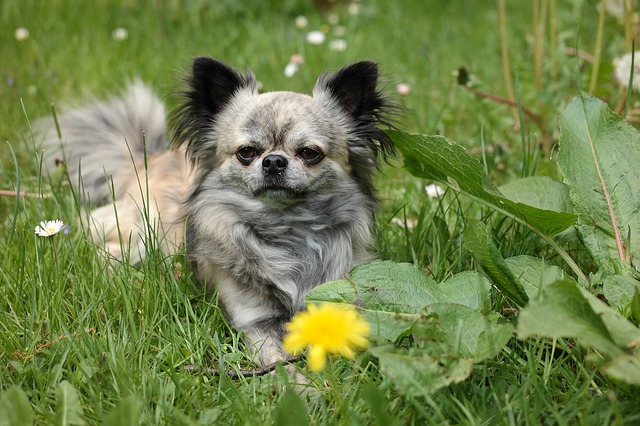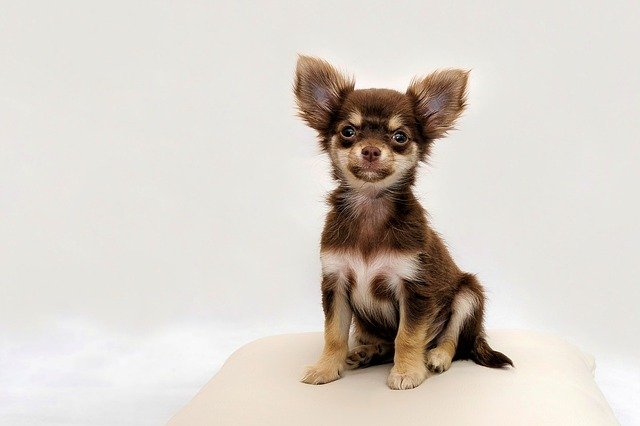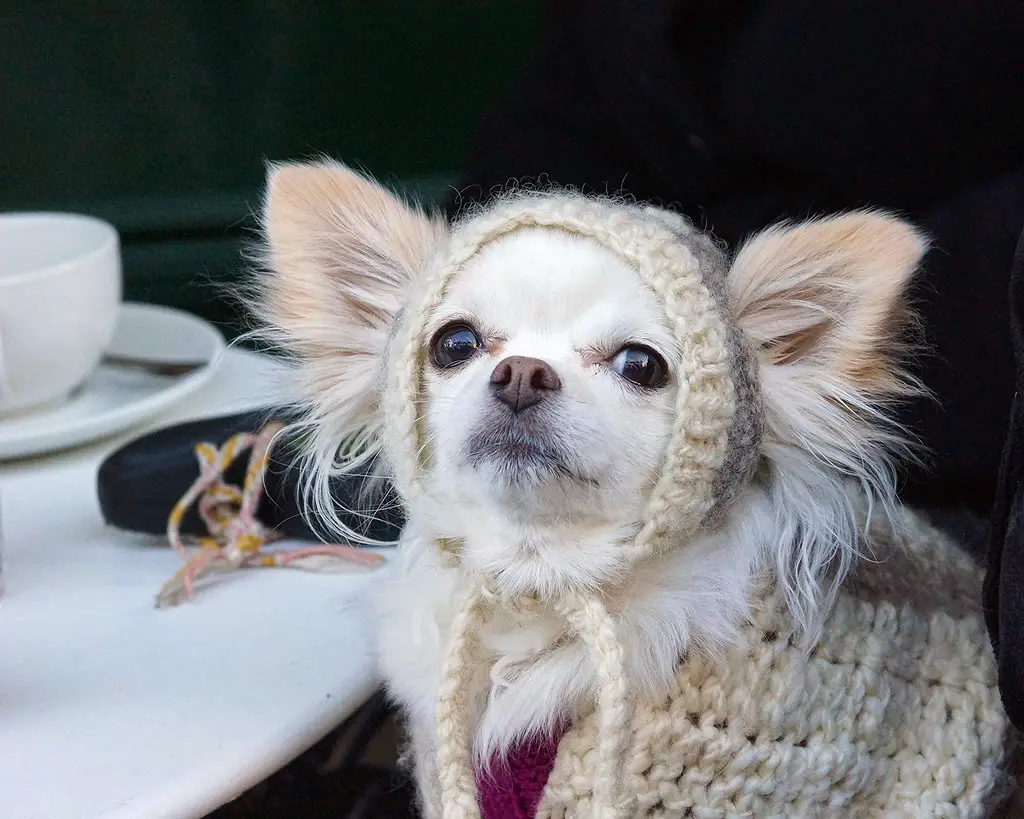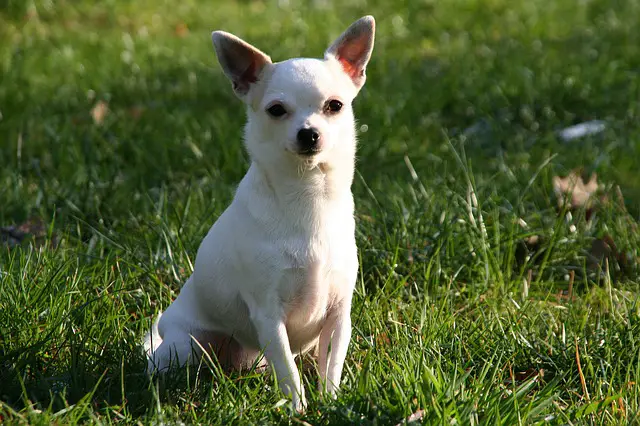Are Chihuahuas prone to skin problems is one of the first questions many new Chi parents ask their vets about.
You see, this breed is indeed quite sensitive and delicate and resultantly, they tend to suffer from skin problems like rashes, blisters, dandruff, skin allergies, etc.
Skin problems could arise due to numerous reasons- right from factors like what your Chi eats to its environment.
Naturally, you will have to consider all thesepossible root causes if you want to prevent and treat skin problems in your Chi.
And that is exactly what this guide is all about! Read on for important information on are Chihuahuas prone to skin problems.
Why Are Chihuahuas Prone to Skin Problems?

Chis are often prone to skin problems due to the following reasons:
1. Genes
Many Chihuahuas are exposed to food, environmental, or seasonal allergens from an early age. Often the breed also has genetic predisposition to skin issues and that too can cause allergies from puppyhood.
2. Food allergens
Sometimes, a Chihuahua might simply develop food allergies which can manifest as skin problems. These food allergies occur due to certain proteins, dairy, soy, wheat or other grains, and even from fillers, dyes, colors, and artificial ingredients in low-quality dog foods.
A Chi might also develop allergy to certain ingredients despite eating them for a long time. In such cases, the dog’s immune system develops histamine to counter the protein which it views as dangerous. This usually causes gastrointestinal issues but, in some dogs, it can cause skin problems like itching, hotspots, dry skin, recurrent ear infections,and so on.
3. Low-Quality Diet
Another common cause of skin problems includes low quality diets. Many dog foods are not fortified with vitamins and minerals and that too could cause deficiencies leading to a dull skin and coat. Your Chi also needs omega fatty acids for a healthy and shiny coat.
Diagnosing of skin problems in Chihuahuas is often not straight forward. Many conditions lead to similar symptoms which is why you’d need to consult a veterinary allergy specialist. For dealing with food allergies, you might even have to try the elimination diet. All these factors can escalate the skin problems further.
What Are Common Skin Problems That Chihuahuas Are Prone to?

Some of the most common skin problems in Chihuahuas are:
1. Flea allergy dermatitis
Also known as FAD for short, flea allergy dermatitis can affect Chihuahuas that have massive flea infestations. The dog’s body produces histamine to counter the antigens in the flea saliva leading to redness, itching, pain, and swelling.
Symptoms of FAD are eczema, skin rash, hair loss or alopecia, redness, itching, swelling, blisters, and pustules and papules. You might typically see these symptoms near its tail, on the belly area, back, and neck.
Treatment includes getting rid of fleas using spot treatment, shampoos, and sprays. Your Chi will also need all-year round protection from fleas.
2. Atopic dermatitis
Atopic dermatitis causes pruritis or excessive itching on your Chi’s skin. It occurs when the dog ingests or inhales a substance it is allergic to.
Symptoms include rubbing, biting, chewing, licking, and scratching the face, ears, paws, and armpits.
Treatment includes the use of essential fatty acid supplements, corticosteroids (in extreme cases), and anti-itch medicines. Your pet will also need anti-histamines to counter the allergic reaction.
3. Hot spots
Also known as canine pyotraumatic dermatitis, hotspots are itchy areas on the skin. Your dog might scratch the affected areas excessively leading to angry, red, pus-filled blisters.
Treatment includes soothing the skin with corticosteroids or other home remedies and also getting rid of the root cause of the inflammation.
4. Yeast infection
Yeast infections occur inside the ear canal but can also affect other parts of the skin. The symptoms include red, crusted areas that have a foul odor. The skin lesions might also ooze liquid. In most cases, yeast thrives when the Chi is on a low-quality, high-carb diet.
Treatment includes topical and oral anti-fungal medicines along with dietary changes.
5. Mange
Sarcoptic mange is a contagious skin disease also known as scabies. It can be transmitted from your dog to people. Scabies is characterized by crusty, red, lesions which ooze liquid. There can be severe hair loss as well.
Treatment of mange includes medicated shampoo and dips and application of ointments and lotions for nearly 2 months. You must separate your affected dog to prevent the skin disease from infecting other dogs and people around it.
6. Fleas and ticks
Fleas and ticks are parasites that burrow underneath your Chihuahua’s fur. Ticks suck your pet’s blood and latch on to the dog’s skin. They can cause a ‘target-shaped’ or bull’s eye rashes on the bitten areas. Fleas are tiny black parasites which also feed on the dog’s blood. They can even bite humans on their legs, back, and other exposed areas of the skin.
Thankfully, fleas and ticks are easily preventable. You can use once-a-month spot-treatments or sprays and shampoos. To get rid of an existing infestation, bathe your pet thoroughly and use a tick/flea collar or spot treatment.
7. Impetigo
Impetigo generally affects younger dogs. It consists of rashes, crusty lesions, pustules, and papules. Your dog might scratch the skin excessively.
8. Seborrhea
Seborrhea causes dandruff-like crusting and flaking in the armpits, belly, ankles, and elbows. You might see the skin flakes on your pet’s bedding too. The greasy flakes have a peculiar odor and can be very itchy. Sometimes, the crusts may also bleed.
Treatment includes antibiotics to clear the infection and also medicated baths and dips.
9. Lick granuloma
Lick granuloma occurs in Chihuahuas that lick excessively. The area will appear red and inflamed and there may be ulceration, inflammation, redness, and hyper-pigmentation too. Treatment includes stopping the licking behavior and application of sprays, lotions, and creams.
What Are Common Allergy Locations in a Chihuahua?

Skin allergies typically occur on the face, paws, hind legs, and ears.
They can also occur within the folds of the skin. Your pet might excessively lick its paws and that might lead to darkening of the fur in those areas.
Tear stains are often a symptom of allergies too. If your Chi has dark tear stains under its eyes it could be due to a food or skin allergy.
In case of demodex or sarcoptic mites can also cause hair loss on the face and body. Your Chi might continuously rub its eyes, chew itself in places, and also suffer from swollen paws. The skin could also ooze oil or become dry and crusty. In some dogs, the chest, eyes, nose, paws, and belly may be affected.
What are Common Causes of Skin Allergies in Chihuahuas?

In Chihuahuas, allergies are of the following types:
1. Food allergies
As explained earlier, many ingredients can cause food allergies in Chis. These mainly include wheat, soy, and other grains, as well as proteins. Common proteins to which Chis are allergic are chicken, eggs, turkey, and fish. Chihuahuas are also allergic to dairy and some may be allergic to artificial flavors, food colors and dyes, or fillers in their food.
Food allergies usually give rise to gastric issues but in some dogs they could lead to skin allergies like hotspots, dandruff, crusting, itchiness, and skin irritation, and so on.
2. Fleas
Fleas are small parasites that suck on your Chi’s blood causing itching, redness, and blisters. A Chihuahua could also be allergic to the flea’s saliva and that can cause flea allergy dermatitis characterized by pus-filled blisters. Often, these need antibiotics for resolution.
3. Environmental allergens
Skin allergies can also occur due to grass, dust mites, and pollen inhaled through the nose. Your Chihuahua’s tiny paws could trap the debris and grass pollen which can cause severe skin allergies in your tiny dog. If your pet wears clothing like sweater or t-shirts then too, the material could rub against your pet’s delicate skin and cause a rash.
Washing your Chi’s clothing in detergent or household cleaners can also cause skin allergies in the form of rashes, redness, and irritated skin. Moreover, the use of certain shampoos, dog deodorants, and flea/tick medicines can all contribute to skin allergies on a sensitive dog.
What are the Signs and Symptoms of Skin Allergies in your Chihuahua?

In Chihuahuas, skin allergies or allergic dermatitis can manifest as follows:
1. Coat changes
One of the most common signs of skin allergies is coat changes. The affected dog might have a dull coat that is devoid of shine and luster. Your pet might also suffer from extreme hair loss and un-seasonal shedding. There may be patchy hair loss with large portions of the skin appearing bald and hairless. In addition to the hair’s texture, your Chi might also have reduced hair growth.
2. Excess scratching, licking, and biting/chewing
If your Chihuahua constantly scratches its ears, muzzle, or belly area or licks its paws excessively, then it is one of the signs of food/environmental skin allergies.
Excess licking can also cause the paws to become red and inflamed. Your Chi might also chew or bite its paws or even its belly region leading to hotspots and red blisters.
3. Chronic infections
Skin allergies not only impact the belly, face, ears, paws, etc. it can also lead to chronic ear, eye, and stomach infections. Recurring infections are all an indication that something needs to change in the dog’s environment or/and diet.
What are the Treatment Options for Chihuahuas with Skin Problems?

Below are some of the treatment options for Chihuahuas with skin problems
1. Corticosteroids
These are topical creams with steroids. You must not over use these as they tend to have side effects. Always consult your vet before using corticosteroids.
2. Anti-histamines
These counter the histamine produced in the blood when your Chi’s body encounters antigens. This helps reduce allergic reactions and control itching, excessive scratching, etc.
3. Immunotherapy
Immunotherapy involves introducing small quantities of allergens in your Chi so it gradually overcomes the allergy.
4. Home care
This includes routine care like bathing your Chihuahua with medicated shampoos and baths, making use of skin sprays and prescription medicines, as well as dietary changes.
7 Natural Skin Care Tips for your Chihuahua with Skin Problems

Here are some natural home remedies and skin care tips for Chihuahuas with skin problems:
1. Make dietary changes
Speak to your vet and change your Chi’s food gradually. Sometimes, simply switching to a novel protein source or high-quality, natural or organic dog food can make a great difference in your pet’s skin condition and prevent major skin disorder.
2. Chamomile
Make a tea using chamomile leaves and flowers. Steep for 2-3 hours and cool the tea completely. Spray this all over your pet’s itchy skin for soothing relief.
3. Diluted apple cider vinegar
Mix apple cider vinegar with distilled water and spray all over your Chi’s hotspots, dandruff, ringworm, yeast infection, and on fleas and ticks too. This can prevent itching and excess scratching, licking, and biting.
4. Feed it yogurt
Probiotics and prebiotic bacteria in yogurt can improve your Chihuahua’s skin and coat tremendously. For our small dogs, just 1-2 tsp of plain yogurt is adequate on a daily basis to prevent major skin problems.
5. Fish oil
Chihuahuas need omega fatty acids to keep their coats nourished, soft, and healthy. You can feed your dog some fish on a daily/weekly basis (provided it is not allergic to it) or supplement it with fish oil supplements.
6. Coconut oil
Coconut oil nourishes and moisturizes your Chi’s skin from the inside out. You can feed 1 teaspoon of organic cold-pressed coconut oil daily or also apply it topically on the problematic areas.
7. Oatmeal bath
Soak your tiny dog in a warm bath mixed with a cup of powdered oatmeal. Colloidal oatmeal soothes irritated skin and reduces inflammation and redness.
Conclusion – Are Chihuahuas Prone to Skin Problems?
Yes, Chihuahuas are prone to skin problems like dry itchy skin, skin allergies, and even infections like yeast, ringworm, mange, scabies, etc.
Many of these issues can be prevented with proper diet, regular medicated baths, and proper grooming.
Your Chi also needs healthy fats like essential fatty acids and coconut oil as well as probiotics and prebiotics to maintain healthy skin and prevent skin issues.


